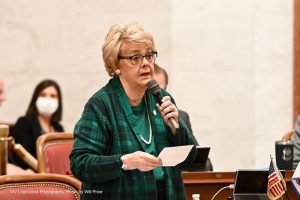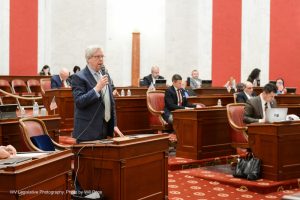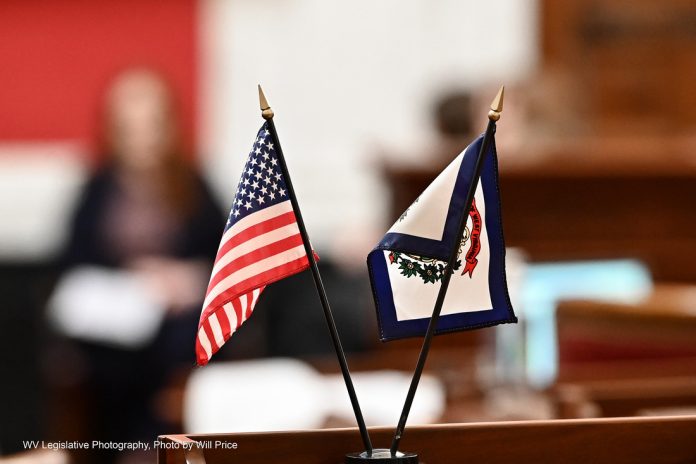During the first session of the 86th Legislature, 333 bills completed the legislative process. Of the 333 bills, 203 were House Bills and 130 were Senate Bills. Thus far, the Governor has signed 109 bills and 2 became law without signature. For a PDF list of completed legislation, please see Completed Legislation of the 2023 Regular Session.
Here are 65 Senate Bills, which completed the legislative process:
Senate Bill 455 removes the requirement that used motor vehicle dealers exclusively sell used motor vehicles. The bill also removes requirements related to minimum display areas for vehicles, minimum office space size and telephone requirements, and minimum opening hours.
Senate Bill 457 removes the prohibition of gambling on private club premises.
 Senate Bill 458 sets the rate of interest on delinquent retirement contribution submissions as the actuarial interest rate assumption as approved by the Consolidated Public Retirement Board for completing the actuarial valuation for the plan year immediately preceding the first day of the plan year in which the delinquency payment is made, compounded daily, and the minimum interest charge is $50. The bill prohibits employer unilateral termination without legislative action.
Senate Bill 458 sets the rate of interest on delinquent retirement contribution submissions as the actuarial interest rate assumption as approved by the Consolidated Public Retirement Board for completing the actuarial valuation for the plan year immediately preceding the first day of the plan year in which the delinquency payment is made, compounded daily, and the minimum interest charge is $50. The bill prohibits employer unilateral termination without legislative action.
Senate Bill 461 clarifies that actions taken by an employer related to declared states of preparedness or states of emergency and matters relating to protected classes under the West Virginia Human Rights Act may not be grieved. The bill exempts the Division of Personnel from being a party to grievances involving DOT employees. The bill provides other guidelines for the grievance procedure.
Senate Bill 463 allows commercial driver’s licenses to allow commercial instruction permits to be issued for a period of up to one year.
Senate Bill 465 increases the amount of money a county commission may have in its rainy day fund to 50% of the county’s most recent general fund budget.
Senate Bill 468 expands the types of vehicles which may be permitted on roads and trails in Cabwaylingo State Forest to include the use of utility-terrain vehicles. The bill permits the Director of the DNR to authorize the development and use of certain connector trails from existing private systems, specifically the Hatfield-McCoy system, to further provide access to state park and state forest recreational facilities.
Senate Bill 469 creates the Cardiopulmonary Resuscitation Instruction Fund to be distributed to county boards to cover the cost of CPR instruction for high school students.
Senate Bill 475 modifies examinations for disability pensions. The bill states that beginning July 1, 2023, a physician shall be chosen by the oversight board to perform a medical exam of the individual in person or virtually. The section method of the exam is at the discretion of the oversight board in consultation with the physician.
Senate Bill 476 exempts the Bureau for Medical Services from all the requirements of the Purchasing Division with respect to managed care contracts except when soliciting a procurement for specialized populations such as foster care.
Senate Bill 478 clarifies to provisions of the West Virginia Jumpstart Savings Program.
Senate Bill 481 extends the sunset provision of the Upper Kanawha Resiliency and Revitalization Program to June 30, 2029.
 Senate Bill 487 reduces the federal adjusted gross income for those taxpayers who retired under an employer-provided defined benefit pension plan that terminated prior to or after the taxpayer retired and that pension plan is covered by a guarantor whose maximum benefit guarantee is less than the maximum benefit the taxpayer would have received had the plan not terminated.
Senate Bill 487 reduces the federal adjusted gross income for those taxpayers who retired under an employer-provided defined benefit pension plan that terminated prior to or after the taxpayer retired and that pension plan is covered by a guarantor whose maximum benefit guarantee is less than the maximum benefit the taxpayer would have received had the plan not terminated.
Senate Bill 488 requires the Higher Education Policy Commission, Community, and Technical College Council, and the institutional governing boards of West Virginia University, Marshall University, and the West Virginia Osteopathic School to update their accreditation rules to conform with the US Department of Education by December 31, 2023.
Senate Bill 490, the Patrol Officer Cassie Marie Johnson Memorial Act, creates knowingly and willfully obstructing a law enforcement officer, probation officer, parole officer, courthouse security officer, correctional officer, the State Fire Marshal, a deputy or assistant fire marshal, firefighter, or emergency medical service personnel engaged in their official duties and causing the death of the person acting in his or her official capacity. The bill establishes a penalty of 15 years to life imprisonment.
Senate Bill 495 deems audio video recordings at juvenile facilities and correctional institutions confidential. The bill does provide for exceptions for when records can be disclosed.
Senate Bill 508 increases the reporting threshold for grassroots lobbying campaigns from $500 to $5,000 in any three-month period and from $200 to $1,000 in a one-month period.
Senate Bill 510, a supplemental appropriation, appropriates $2.4 million to the Increased Enrollment Surplus within the State Department of Education.
Senate Bill 516 modifies the disclosure requirements for individual contributions to an independent expenditure from $250 to $1,000.
Senate Bill 522 allocates a portion of the excise taxes counties retain from transfers of title to real estate in the county to funding for election administration and physical and cyber security, and for infrastructure and cyber security for electronic recording of transfers of real property.
Senate Bill 523 modifies the requirements for spending from the Economic Development Fund to offer incentives for businesses to come to WV. The bill removes the $200 floor for financing “high-impact development projects” and establishes a cap of $300 million.
Senate Bill 526 requires that the Bureau of Public Health educate healthcare professionals on the importance of detecting, diagnosing, counseling, and other treatment for cognitive impairment Alzheimer’s, and dementia
Senate Bill 527 allows a living veteran’s spouse, child, grandchild, parent, or sibling to access military records with the county clerk. The bill further clarifies that such records are public after 62 years, consistent with the federal law in the National Archives.
Senate Bill 529 provides for recognition of Limited Liability Limited Partnerships.
Senate Bill 533 allows recycling cooperatives to own more than one vehicle to collect and transport recyclable material.
 Senate Bill 534 allows for the sale of frozen beer in a sealed growler or from a frozen beverage machine to fill growlers. The bill allows for wineries, licensed brewers, and resident brewers to sell at private fairs and festivals. The bill also allows for a licensed distillery, mini-distillery, or micro-distillery manufacturing liquor to sell at private fairs and festivals. The bill modifies several definitions and fees.
Senate Bill 534 allows for the sale of frozen beer in a sealed growler or from a frozen beverage machine to fill growlers. The bill allows for wineries, licensed brewers, and resident brewers to sell at private fairs and festivals. The bill also allows for a licensed distillery, mini-distillery, or micro-distillery manufacturing liquor to sell at private fairs and festivals. The bill modifies several definitions and fees.
Senate Bill 543 makes changes to the higher education rules process.
Senate Bill 544 increases the size of power purchase agreements from 500kW to 1000kW.
Senate Bill 546 adds certain opioids and other drugs to Schedule I drugs. The bill also adds delta-8, delta-10, delta 8-O, and Delta 9-O to the list of Scheduled I drugs. The “O” signifies synthetically made cannabinoids. The bill does state that naturally occurring tetrahydrocannabinol with THC levels low enough to qualify under the Hemp Act are not subject to the provisions of the bill.
Senate Bill 548 states lienholders can redeem a delinquent property through the payment of outstanding taxes and interest. The bill requires bidders to pre-register for a public auction held by the Auditor. Citizens and entities with a connection to a “Country of Particular Concern” cannot participate in the Auditor auctions. Those countries include Burma, China, Cuba, Eritrea, Iran, North Korea, Nicaragua, Pakistan, Russia, Saudi Arabia, Tajikistan, and Turkmenistan.
Senate Bill 552 inserts a severability cause into the Unborn Child Protection Act.
Senate Bill 553 allows for a best-value procurement evaluation for prequalified bidders.
Senate Bill 558 prohibits law enforcement agencies from posting on social media the booking photographs of individuals arrested for “minor crimes” with exceptions.
Senate Bill 561 transfers the administration of the Drinking Water Treatment Revolving Fund from the Department of Health and Human Resources to the Department of Environmental Protection.
Senate Bill 568 clarifies the Dangerousness Assessment Advisory Board provides an objective professional recommendation to judges on appropriate levels of security for a person who has been found incompetent to stand trial or not guilty by reason of mental illness. The DHHR has no supervisory authority over the board, as the DHHR has an interest in the proceedings.
Senate Bill 573 updates the child support formula, adds criteria for attributed income, and addresses incarcerated parents.
Senate Bill 577 caps the cost of insulin at $35 for a 30-day supply and for devices at $100.
Senate Bill 579 directs payment of a claim against the Racing Commission in the amount of $16,219.58.
Senate Bill 591 allows counties and municipalities to develop economic projects together and to share proportionally in project costs and revenues generated from the project.
Senate Bill 594 clarifies cost-sharing calculations for high-deductible health plans.
Senate Bill 597 increases the number of non-classified service employees that the Commissioner of Workforce West Virginia is authorized to hire to 200 employees.
Senate Bill 605 requires the Chief Medical Examiner to authorize a person for a position within the Office of the Chief Medical Examiner to recover anatomical gifts by identifying potential donors, evaluating donor eligibility, and obtaining recovery authorization.
Senate Bill 608 corrects the definition section relating to deadly weapons.
Senate Bill 609 states that no existing electrical power plant in the state may be decommissioned or deconstructed without prior approval of the Public Energy Authority.
Senate Bill 613 exempts hospitals providing defined hospital services from certificate of need requirements. The bill removes birth centers from health services required to obtain a certificate of need.
Senate Bill 617 sets guidelines for submitting reports on cases involving instances of substantiated abuse and neglect involving a person with a developmental disability. The bill also establishes a mental health ombudsman. The bill requires a workforce study of the Intellectual and Development Disabilities Waiver Program.
Senate Bill 625 adds micro-school programs to the list of programs whose transcripts or other credentials must be accepted by a public school as a record of a student’s previous academic performance.
Senate Bill 631 to expend federal appropriations from Congress to the Secretary of State for purposes that further the administration of federal elections held in the state.
Senate Bill 633 provides specific guidance as to how courts are to enter a capias warrant against a defendant for failure to appear.
Senate Bill 647 limits the period “substantiated” child abuse claims can be disclosed to prospective employers. The bill directs that where an allegation of abuse and neglect is substantiated by DHHR, but no petition is filed the record must be sealed 12 months after the complaint is deemed unsubstantiated.
Senate Bill 649 authorizes the Berkeley County Council to change its name to the Berkeley County Commission.
 Senate Bill 661 provides that an employee who is off work due to a compensable injury be given preferential recall right if the job is still available and the employee’s request to be reinstated is mailed to the employer.
Senate Bill 661 provides that an employee who is off work due to a compensable injury be given preferential recall right if the job is still available and the employee’s request to be reinstated is mailed to the employer.
Senate Bill 665 modifies the requirements for licensure as a massage therapist, expanding the qualifications standards and increasing the hours of supervised academic instruction from 500 hours to 625.
Senate Bill 667 permits the Legislative Auditor to conduct performance audits of the West Virginia Secondary Schools Activities Commission to examine the revenues, expenditures, and performance.
Senate Bill 674 recognizes the memorandum of understanding known as the West Virginia First Memorandum of Understanding filed in the Circuit Court of Kanawha County, which called for the creation of the WV First Foundation. The Foundation will be responsible for receiving and distributing opioid funds.
Senate Bill 677 clarifies the responsibilities of the State Resiliency Officer.
Senate Bill 678, a supplemental appropriation, allocates $1.2 million to the Division of Human Services for Social Services.
Senate Bill 679 authorizes the Office of Inspector General to create legislative rules relating to forensic group homes.
Senate Bill 688 allows county boards to hire a retired teacher to provide tutoring services to students who need additional one-on-one instruction in reading and math.
Senate Bill 730 expands the authority of the Legislative Oversight Committee on Health and Human Resources Accountability to the successor agencies of the DHHR, as the department will be split into three departments.
Senate Bill 733 authorizes DNR to issue lifetime nonresident statewide licenses for hunting and trapping, fishing, and bear hunting and nonresident stamps for trout fishing, archery deer hunting, muzzleloading deer hunting, turkey hunting, and national forest hunting, fishing, and trapping.
Senate Bill 734 establishes the requirement for the Chief Information Officer to develop and implement an information technology modernization strategy for the procurement, adoption, and utilization of cloud computing services by the state and its agencies.
Senate Bill 735 corrects code errors to reflect proper departments responsible for specific programs.
Senate Bill 737 creates the Emergency Medical Services Salary Enhancement Fund to supplement the salaries of county EMS personnel.
Senate Bill 740 increases compensation and expense reimbursements for members of the Legislature.

